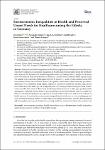Socioeconomic Inequalities in Health and Perceived Unmet Needs for Healthcare among the Elderly in Germany
Hoebel, Jens
Rommel, Alexander
Schröder, Sara Lena
Fuchs, Judith
Nowossadeck, Enno
Lampert, Thomas
Research into health inequalities in the elderly population of Germany is relatively scarce. This study examines socioeconomic inequalities in health and perceived unmet needs for healthcare and explores the dynamics of health inequalities with age among elderly people in Germany. Data were derived from the Robert Koch Institute’s cross-sectional German Health Update study. The sample was restricted to participants aged 50–85 years (n = 11,811). Socioeconomic status (SES) was measured based on education, (former) occupation, and income. Odds ratios and prevalence differences were estimated using logistic regression and linear probability models, respectively. Our results show that self-reported health problems were more prevalent among men and women with lower SES. The extent of SES-related health inequalities decreased at older ages, predominantly among men. Although the prevalence of perceived unmet needs for healthcare was low overall, low SES was associated with higher perceptions of unmet needs in both sexes and for several kinds of health services. In conclusion, socioeconomic inequalities in health exist in a late working age and early retirement but may narrow at older ages, particularly among men. Socially disadvantaged elderly people perceive greater barriers to accessing healthcare services than those who are better off.
Notes
‘European Union (EU)’ and ‘Horizon 2020’
No license information

